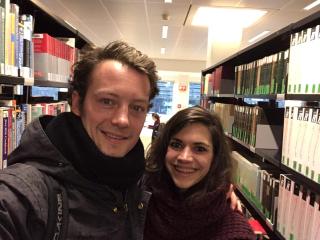Polarization in the Netherlands actually is not that bad
Discussions about important societal issues, whether they relate to domestic or foreign affairs, on the street and in academia, seem to be intensifying. The heightened tone, personal attacks, and polarization are characteristic of these discussions. Is this a prevailing feature of our time, or is it just our perception? Who should take the lead in countering polarization - the government or citizens? A conversation with Juliette Schaafsma, a Professor at the Department of Communication and Cognition of the Tilburg School of Humanities and Digital Sciences.
Individuals experience polarization, but is that sentiment objectively justified, especially when compared to the past?
‘There are different forms of polarization. We speak of ideological polarization when differences between political views become more extreme. We also refer to factual polarization when there are significant differences in what people perceive as “the truth.” Additionally, there is affective polarization, when individuals develop strongly negative feelings about those with differing opinions.
Research indicates that many people in the Netherlands believe that polarization is increasing. They feel that the tone of the debate is unpleasant, positions have hardened, and discussions have become more intense. However, research shows that divisiveness in the Netherlands has not necessarily increased. When you look at ideological polarization, differences in opinions on issues like income distribution and immigration or integration have not grown. Nor is there a movement towards extremes. There are indications, though, that people have become somewhat more negative about those with different political views, especially if they strongly identify with a political party.

Substantive arguments, which is what you need in a well-functioning democracy, risk being underexposed
However, compared to other countries, polarization in the Netherlands is not that bad. The culture of consensus is deeply ingrained, and in our multi-party system, compromise has always been essential. What stands out is that polarization is sometimes used as a means to gain attention. In our current media landscape, this often works well: shouting tends to attract more attention. For populist politicians and political parties, polarization is their raison d’être. They have an interest in fueling the fire. They do so by exaggerating topics that, for instance, touch upon people’s cultural identity. That works every time.
You also see that citizens trust the government less because politics has not been able to tackle or solve major problems. Populist parties exacerbate this by emphasizing vertical and horizontal divisions: the people versus the elite, or we, the Dutch, against newcomers. This mechanism is sometimes insufficiently exposed in the media. They tend to pay a lot of attention to those who shout the loudest. Substantive arguments, which is what you need in a well-functioning democracy, risk being underexposed.’
Many people still have the idea that polarization has never been as bad as it is now. Is that true?
‘Affective polarization also existed in the past. For example, in the 1970s and during the pillarization era, significant differences existed, but they were kept in check by the system. I do think that discussions were conducted differently in the media and in politics. The codes about what you could and could not say were stricter, and emotions were less in the foreground. Terms like “fake parliament” were not common, and a Cabinet Minister was not portrayed as a witch by MPs.
It is often thought that social media is now causing polarization. However, research does not provide a uniform picture. Social media can act as catalysts, but people’s political experiences are still shaped by their immediate environment and the traditional media.’
We are faced with the question of who we are and where we are going
Globalization has led to foreign conflicts being imported. To what extent does the impact of globalization contribute to the exaggeration of differences in the Netherlands?
‘Globalization certainly plays a role, the influx of asylum seekers, the EU, wars, climate change. As a result, people feel that their way of life is threatened and at the same time it makes them feel insufficiently protected by the government or not at all. We are faced with the question of who we are and where we are going. The narrative that has driven our economy in past decades, in which growth was leading, is no longer sustainable; there is an end to Earth’s resources. So, a new narrative must emerge that binds us together and that takes the challenges we face into account.’
Do you also see sharper contrasts at the university and in academia?
‘I think it could be a lot worse. It is remarkable how few discussions there are at this university. I sometimes get the impression that this is not encouraged or that attempts are quickly made to defuse any tension under the guise of ‘connection.’ We, at university, should be especially capable of engaging in critical discussions with each other in a respectful way but vigorously, nonetheless. We should not be too quick to label that as ‘polarization.’ We should be able to agree to disagree.’
Ministers will also have to be honest and tell citizens that sometimes they have to give up something to gain something in the future
And what is the recipe for rapprochement?
‘What has disappeared is an overarching narrative about who we are and where we are going. A shared vision like that is crucial. It shouldn’t be a Dutch folk tale but that of a democracy in which, despite our differences, we cherish certain things that we share. I think, for example, that most people value good healthcare, good education, and a fair distribution of income. Ministers will also have to be honest and tell citizens that sometimes they have to give up something to gain something in the future. On a small scale, people can be brought into more contact with each other and should be encouraged to empathize with each other. But there is also a crucial role for politics and the media. Politicians can adopt a different tone and should not allow themselves to be mainly guided by opinion polls. And the media must dedicate more space to genuine, substantive political discussions.’
Date of publication: 25 December 2023



